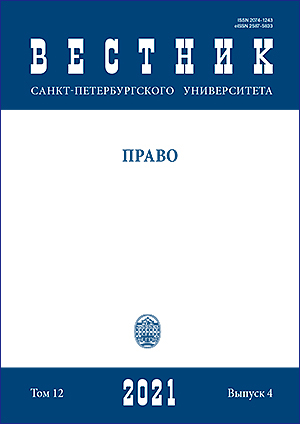Пределы принятия юридически значимых решений с использованием искусственного интеллекта
DOI:
https://doi.org/10.21638/spbu14.2021.405Аннотация
Искусственный интеллект — одна из «сквозных цифровых технологий», предопределяющих современный ландшафт развития общества. Ключевая проблема ее применения с точки зрения права — пределы принятия юридически значимых решений с использованием искусственного интеллекта. Хотя на поверхности данная проблематика может показаться достаточно новой, в действительности она рассматривается в юридической науке и междисциплинарных исследованиях уже не один десяток лет. Указанные пределы могут быть разделены на парадигмальные, аксиологические и прагматические. Парадигмальные пределы связаны с фундаментальными представлениями о значении субъектности права и предопределяют принцип человеческого участия в решениях, принимаемых с помощью искусственного интеллекта. Аксиологические пределы предполагают последовательную реализацию определенных формализованных ценностей применительно к новым общественным отношениям. Наиболее разработанная система аксиологических пределов вытекает на данный момент из европейской концепции прав человека. Прагматические пределы обусловлены особенностями как самого права, так и технологической архитектуры искусственного интеллекта в социальном контексте. К числу прагматических пределов в данном смысле относятся проблемы «открытой текстуры» юридического языка и «смысловых пределов» права. Также в качестве прагматического предела может быть рассмотрен принцип недискриминации субъектов права при машинном обучении. Анализ современного регуляторного ландшафта на уровне практик регулирования и саморегулирования, сосредоточенный на репрезентативном международном опыте, позволяет верифицировать гипотезу о парадигмальных, аксиологических и прагматических пределах и предложить использовать их при дальнейшем развитии правового регулирования отношений в областипринятия решений с использованием систем искусственного интеллекта.
Ключевые слова:
искусственный интеллект, право, алгоритмическое принятие решений, юридически значимые решения, пределы права, цифровая экономика
Скачивания
Библиографические ссылки
Загрузки
Опубликован
Как цитировать
Выпуск
Раздел
Лицензия
Статьи журнала «Вестник Санкт-Петербургского университета. Право» находятся в открытом доступе и распространяются в соответствии с условиями Лицензионного Договора с Санкт-Петербургским государственным университетом, который бесплатно предоставляет авторам неограниченное распространение и самостоятельное архивирование.






